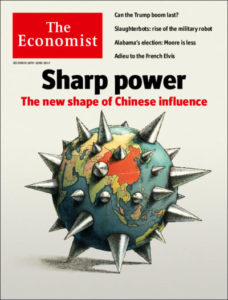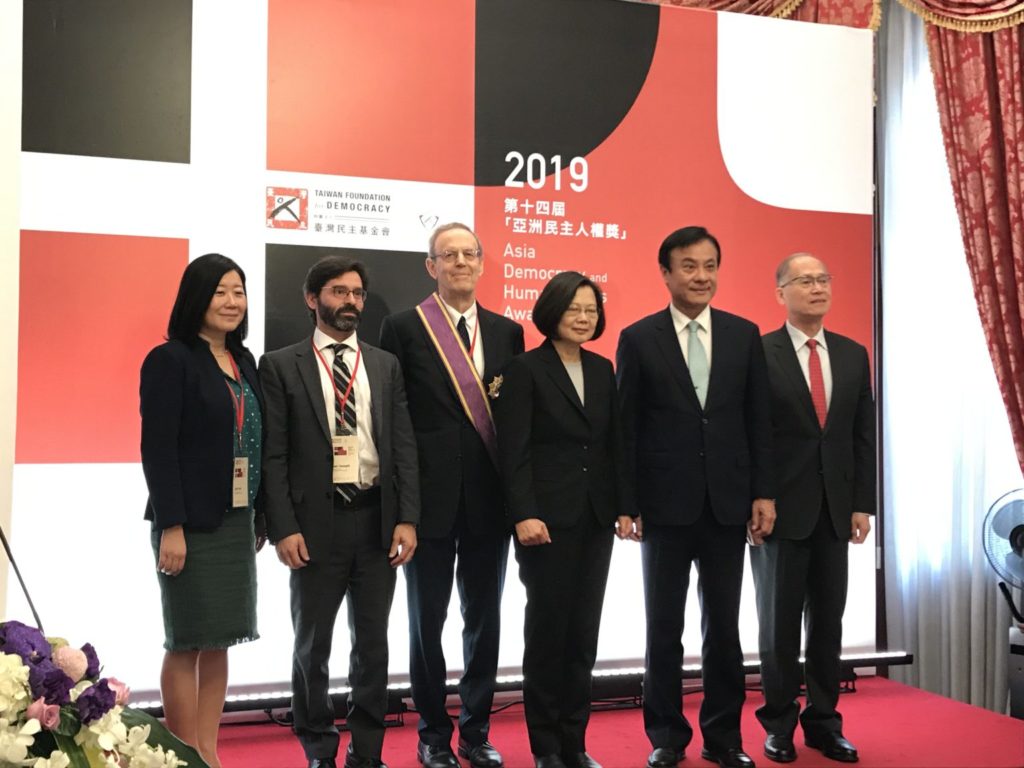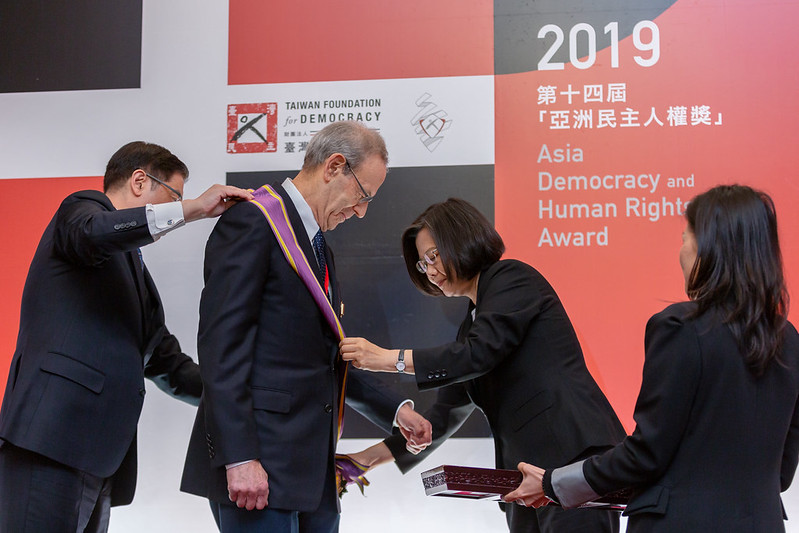Taiwan is committed to standing with the international community in upholding the universal values of democracy, freedom and human rights, President Tsai said in remarks at the 14th ADHR Award ceremony organized by Taiwan Foundation for Democracy in Taipei City. Noting this year’s World Human Rights Day marks the 40th anniversary of the Kaohsiung Incident in Taiwan, Tsai said the country has overcome tremendous hardship in its democratic transition, as she presented the 14th Asia Democracy and Human Rights Award to the Diplomacy Training Program and conferred the Order of Brilliant Star with Grand Cordon on Mr. Carl Gershman, President of the National Endowment for Democracy (NED).
 No country faces greater threats and pressures than Taiwan, said Gershman. These include ceaseless military exercises targeting Taiwan and diplomatic efforts to isolate it internationally; the use of Sharp Power to undermine it politically and of economic leverage to coerce it and subdue it through absorption; and clandestine operations to manipulate Taiwan’s elections (as we know from the recent testimony of Wang Liqiang, the spy who recently defected in Australia).
No country faces greater threats and pressures than Taiwan, said Gershman. These include ceaseless military exercises targeting Taiwan and diplomatic efforts to isolate it internationally; the use of Sharp Power to undermine it politically and of economic leverage to coerce it and subdue it through absorption; and clandestine operations to manipulate Taiwan’s elections (as we know from the recent testimony of Wang Liqiang, the spy who recently defected in Australia).
Yet all this bullying and attempted subversion have not had the desired effect. As President Tsai said in her National Day Address, the threats and challenges faced by Taiwan “have made us stronger and more determined,” and they have contributed to an increasingly robust sense of national pride and identity, Gershman told the Forum;
There are many military, diplomatic, economic, and other measures that Taiwan must take to defend itself. But nothing is more important than for it to remain a strong, united, and inclusive democracy. It is democracy that Xi Jinping fears most, because he is fully aware that Communist China suffers from what Columbia University scholar Andy Nathan has called “a birth defect that it cannot cure,” which is that its dictatorial system lacks political legitimacy.
Few people have advocated more strongly for democracy in #Taiwan than @NEDemocracy President Carl Gershman, Tsai Ing-wen @iingwen tweeted. It was an honor to confer the Order of Brilliant Star with Grand Cordon today & thank him once again for his many years of friendship.
Many Taiwanese have not fully recognized that the current election is at the center of a clash between two forces – China vows to reset the existing liberal international order, while the U.S. endeavors to strengthen it, analyst Yu-hua Chen writes for Taiwan Insight:
- China’s most visible and longest-held measure for influencing Taiwan’s elections is military intimidation. Since Tsai assumed office, China has ramped up military coercion considerably by conducting military exercises in Taiwan’s vicinity, and periodically dispatching its navy and air force to circumnavigate the island. These military maneuvers attempt to undermine faith in the Tsai government and sends an aggressive political message that the Taiwan Strait is China’s territorial water…..
 China’s second measure for intervening in Taiwanese elections is through media. China has greatly expanded its global media reach since 2008 through “the Grand Propaganda Plan.” The plan aims to boost China’s voice in the international community, where “the say” is mostly monopolized by Western media. Part of this plan is buying media outlets in Taiwan, enabling Beijing to influence the Taiwanese public by controlling what is broadcast. One study of the 2018 election conducted by the National Communication Commission of Taiwan paints a worrying picture of Beijing’s control over Taiwan’s media…..
China’s second measure for intervening in Taiwanese elections is through media. China has greatly expanded its global media reach since 2008 through “the Grand Propaganda Plan.” The plan aims to boost China’s voice in the international community, where “the say” is mostly monopolized by Western media. Part of this plan is buying media outlets in Taiwan, enabling Beijing to influence the Taiwanese public by controlling what is broadcast. One study of the 2018 election conducted by the National Communication Commission of Taiwan paints a worrying picture of Beijing’s control over Taiwan’s media…..- The third and newest development is China’s weaponization of its cyber capability as a tool for intervening in other states’ domestic affairs. China realized the importance of cyberwarfare as early as 2000, and Xi Jinping greatly fortified China’s capability in this domain through military reforms and establishing the Central Cyberspace Affairs Commission. China is currently outpacing the U.S. and Ian Easton, Senior Director of Project 2049 said, “this is a fight that we are losing.”
The fate of Taiwan’s upcoming elections changed on November 13. Until that day, the Chinese Nationalist Party (Kuomintang or KMT) had a strong lead ahead of the ruling Democratic Progressive Party (DPP) in the Legislative Yuan polls, note analysts Lev Nachman, a Fulbright research fellow, and Brian Hioe, a founding editor of New Bloom, an online magazine covering activism and youth politics founded in the wake of the Sunflower Movement.
 Even with six months of constant protest in Hong Kong and a failing presidential candidate (Han Kuo-yu), as a party the KMT was still polling higher than the pro-Taiwan DPP. A week later, the KMT and DPP’s positions began to switch. The KMT fell in the polls and today continues to drop. The DPP’s odds of maintaining their legislative majority drastically increased because of a feature of Taiwanese politics that many are not familiar with: the party list, they write for The Diplomat:
Even with six months of constant protest in Hong Kong and a failing presidential candidate (Han Kuo-yu), as a party the KMT was still polling higher than the pro-Taiwan DPP. A week later, the KMT and DPP’s positions began to switch. The KMT fell in the polls and today continues to drop. The DPP’s odds of maintaining their legislative majority drastically increased because of a feature of Taiwanese politics that many are not familiar with: the party list, they write for The Diplomat:
Although the DPP is in a much stronger position than they were a month ago, their ability to retake the Legislative Yuan is hardly a sure thing. With a month to go until the election, the KMT still has a chance to regain lost ground. More than a few of the DPP’s contested seats that they won in 2016 will not be easily retaken in 2020. There is still a real possibility they will not maintain their majority. The party list fiasco, however, has hurt the KMT in an unprecedented way that they were unprepared for. Although the DPP still has an incredibly tough battle for the Legislative Yuan, their election just got a bit easier.
Taiwan has not chosen to be a global symbol of democratic universalism, said the NED’s Gershman.(below, with NED staffers Lynn Lee and Brian Joseph, far left and second right, respectively). “And i did not anticipate that it would become one when I came here 25 years ago, hoping that Taiwan might establish an institution to promote democracy in the world,” he added. “It now has such an institution [the Taiwan Foundation for Democracy, above], and for that I’m very grateful. But China’s rise as a dictatorship, and the threat that it now poses to countries in East Asia and beyond, have given the democratic system established so successfully in Taiwan a much larger significance.” RTWT



 Taiwan views the situation in Hong Kong as a
Taiwan views the situation in Hong Kong as a 





